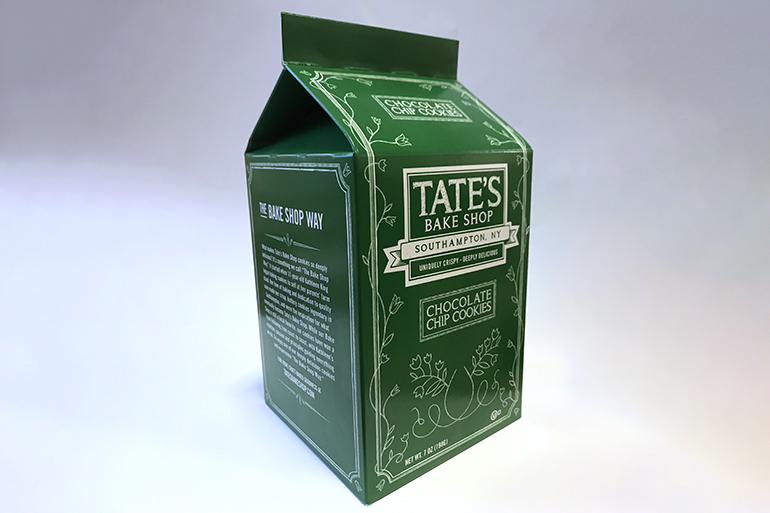$60B Scandal: Refunding Twice for Same Thing May Rattle Markets

Probably the most famous local person in the Hamptons is Kathleen King. A tribute to her is found on the packaging of every bag of Tate’s Cookies. There have been millions and maybe billions sold around the world.
It reads, “It started when 11-year-old Kathleen King began baking cookies to sell at her parents’ farm stand. Her love of baking and dedication to quality made her crisp, buttery cookies legendary in Southampton, and were the inspiration for what eventually became Tate’s Bake Shop. While our Bake Shop is still a local favorite, our cookies have won a loyal following from coast to coast, with Kathleen’s intuition, passion and principles guiding everything we do.”
And besides that, her cookies have given great pleasure to people from around the world, and it’s made her very rich. She sold her company in the company she founded for $100 million and continued to be an advisor.
RELATED: Riverside Sells Tate’s Bake Shop to Oreo Owner Mondelēz for $500 Million
This story is about the good and bad ways to become rich in business. One local man became rich by betting that stocks would collapse in the crash of 2007 and 2008. He won. But he’s used much of his newly earned money to help the community by building hospital wings. This is doing good with newly made riches. Bernie Madoff, who had a house in Montauk, became rich by fleecing investors out of $50 billion dollars. It caused much suffering. This is an example of a bad way to get rich.

A final example was millionaire Carl Fisher. In the 1920s he bought all of Montauk, open land at that time, and began converting it into a world- class resort. He’d made millions elsewhere and was making a bet here. Though he lost everything in the Crash of 1929, and left us with a new downtown featuring a full grid of roads, some stores on that grid, a tall office building, several churches, a polo field, yacht club, surf club, indoor glass-enclosed tennis courts, a new Montauk Harbor for ships, a golf course and a giant hotel on a hill, some of which are thriving today.
On the international scene, many good works have resulted from people getting rich. Steve Jobs is an obvious example. Elon Musk is another.
Today, however, I want to talk about a group of people who recently got very rich by arranging a legitimate tax refund to happen twice due to an unintended glitch in government processes and paperwork in Europe. This is bad.
This scandal has resulted, according to The New York Times, in a $60 billion windfall for these folks during nearly five years of operation. It seems to me that you could fill entire glass skyscrapers with millionaires who have resulted from the money made in this way.
The Times quoted a lawyer, now that charges have been filed—two bankers have been accused and will be tried in Germany, a New Zealander named Paul Mora and the Oxford-educated Martin Shields—saying that the underlings at a law firm that worked with the accused wer reportedly told, “Whoever has a problem with the fact that because of our work there are fewer kindergartens being built, here’s the door.” In all these years, it appears greed has kept mouths shut. Now, trials loom.
The double dip possibility was discovered by some enterprising international bankers in the early 2000s in the processes pertaining to numerous European countries. As the Times explains this complicated procedure works, “the goal was to fool the financial system so that two investors could claim refunds for dividend taxes that were paid
just once.”
The trade involves dozens of transaction forms—in a particular rhythm so the timing is exactly a certain way, and if you do that, the government of the country in which you executed the trade pays a refund a second time on the same dividend tax.
Banks reportedly involved include Bank of America Merrill Lynch, JP Morgan Chase and Morgan Stanley, among others. The refunds come from public funds, so countries in the EU have $60 billion less income to play with and can build fewer kindergartens.
This is the kind of loophole that the British probably noticed—they complained of excessive paperwork—saw no fixes being made and so made it one of the causes of leaving the EU.
Wall Street is worried that convictions could result in a severe dent in the world economy.
And oddly, The Wall Street Journal refers to this matter from their own perspective. WHY ARE THESE DEAD TAX TRADES CAUSING SUCH A STIR?—THE SHORT ANSWER they headlined in a story in 2015. A more recent article, last December, was headlined BLACKROCK OFFICES RAIDED IN GERMAN TAX PROBE. Maybe something wrong there, maybe not.
Lawyers for the two men accused, who claim no wrongdoing, say their defense will draw upon the notion that doing this was not illegal. If the laws were set up so this could happen, what’s the problem?
Hey, isn’t money everything?









